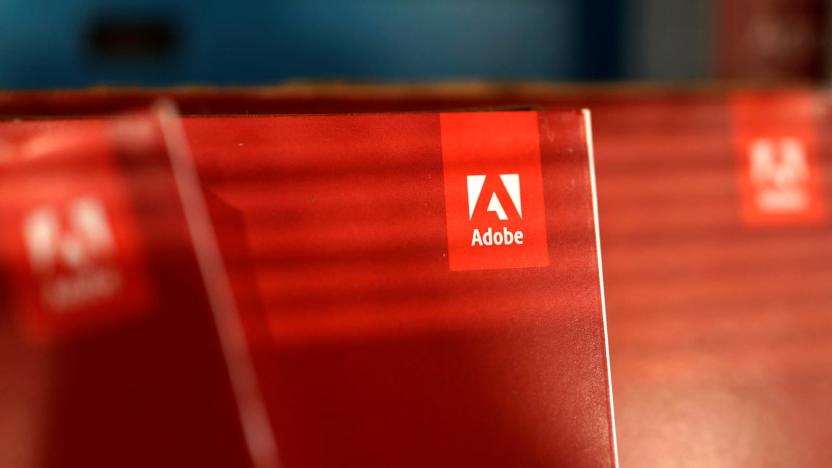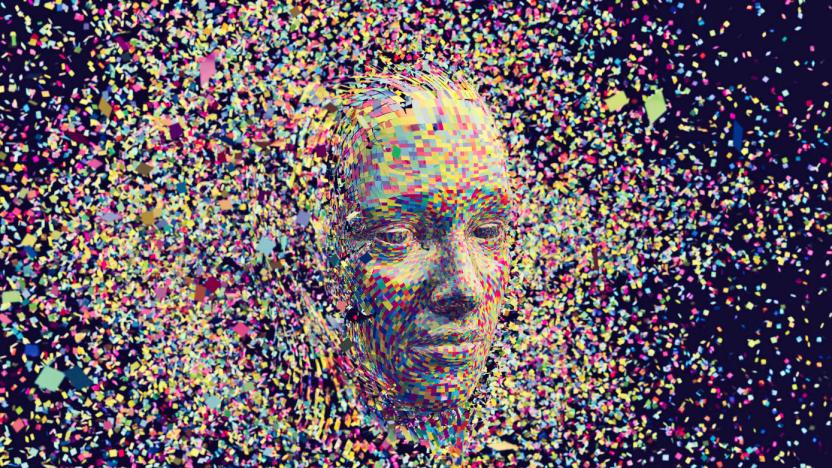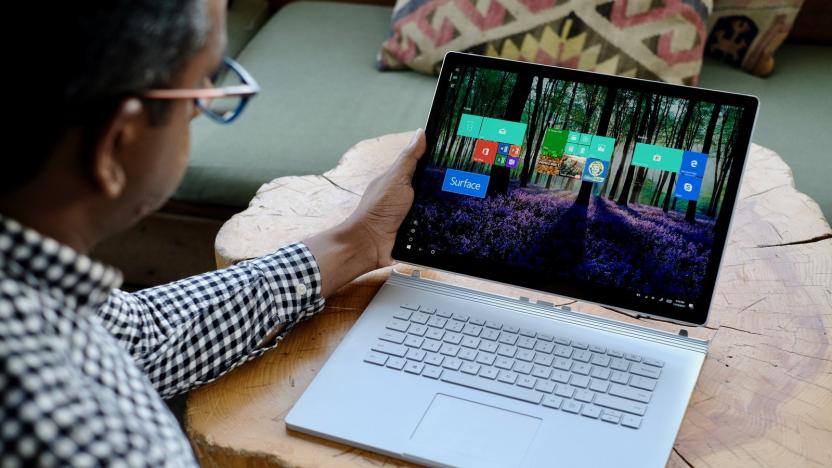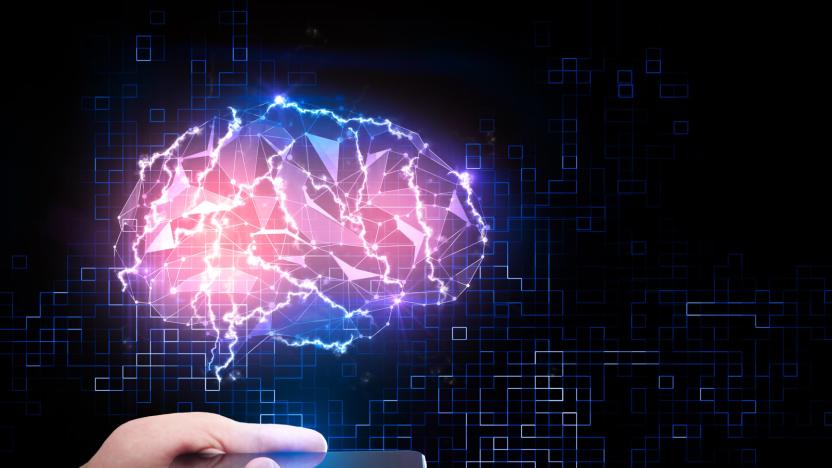MachineLearning
Latest

Google will predict Final Four performance based on in-game data (updated)
Google has been working closely with the NCAA during this year's tournament, but now, during the Final Four, the company will be using predictive analytics to make predictions about second half performance. The wrinkle here is that the team will use data from the first half of the game to come up with their prediction during halftime. They'll then create an ad right in the Alamodome, which will air before the beginning of the second half of the game.

Facebook is hosting an online abuse summit with other tech leaders
Facebook is trying to bring all the wars it's fighting under one roof. At the "Fighting Abuse @Scale" conference later next month, the social network will host talks on combating fake news, online fraud, spam and abuse in general. There's a special focus on how the different companies in attendance are using AI and machine learning to achieve their goals.

NVIDIA teams with Adobe to ensure AI editing runs smoothly
Adobe and NVIDIA are partnering up to power up the former's cloud-based AI endeavors with the latter's GPUs. Each new update for software in Adobe's suite leans more on its artificial intelligence toolkit Sensei to improve editing features, and it makes sense to tap NVIDIA's chips to ensure those run smoothly.

Alphabet's X lab explores using AI to improve food production
Add Alphabet to the growing number of companies hoping that AI will solve food production problems. The Google parent brand's X lab has revealed that it's exploring ways machine learning could improve farming. While X hasn't focused on any specific solutions, lab leader Astro Teller told MIT Technology Review that AI could be combined with drones and other robotics. It could help determine when to harvest crops, or adapt farms in areas where climate change makes forecasting difficult.

Could Google’s ‘Smart Sound’ be more than just a gimmick?
Welcome to your living room, the latest battleground for tech companies vying for your allegiance. What started as Amazon staking its claim with the Echo line of smart speakers now includes competition from Google and Apple, too. It's not just tiny smart speakers, either -- all three companies have launched Hi-Fi systems in the past few months in an attempt to appeal to audiophiles. But while the Sonos One with Alexa and the Apple HomePod have mustered a ton of press since their debuts, the Google Home Max hasn't picked up quite as much traction. It's not that the Home Max is underwhelming -- it's just that the Sonos One is surprisingly affordable, while the HomePod launched to much fanfare because it's Apple's first foray into the smart-speaker space. For its part, Google has focused on extolling the benefits of machine learning in the Home Max. This time it's being marketed as Smart Sound, and it's the special sauce that enables the Max to tune itself to any room. But it's still a work in progress, and whether it's doing anything that's discernible to the human ear is up for debate.

EA is teaching AI troops to play 'Battlefield 1'
It's been a couple of years since AI-controlled bots fragged each other in an epic Doom deathmatch. Now, EA's Search for Extraordinary Experiences Division, or SEED, has taught self-learning AI agents to play Battlefield 1. Each character in the basic match uses a model based on neural-network training to learn how to play the game via trial and error. The AI-controlled troops in the game learned how to play after watching human players, then parallel training against other bots. The AI soldiers even learned how to pick up ammo or health when they're running low, much like you or I do.

Machine learning could lead to smarter mobile notifications
Push notifications on phones are both a blessing and a curse. After all, it's important to get information you need when it happens. But some apps send way too many push notifications, which often leads to turning off notifications for the app or deleting it altogether. The question is, how do you balance between necessary and extraneous push notifications? A new AI, outlined by Ton Ton Hsieng-De Huang and Hung-Yu Kao on arXiv.org, may be able to do just that.

New Yorker applied machine learning to blocked bike lane problem
Alex Bell likes to bike around New York City, but he got fed up with how often bike lanes were blocked by delivery trucks and idling cars. So he decided to do something about it, the New York Times reports. Bell is a computer scientist and he developed a machine learning algorithm that can study traffic camera footage and calculate how often bike and bus lanes are blocked by other vehicles. He trained the algorithm with around 2,000 images of different types of vehicles and for bus lanes, he set the system to be able to tell the difference between buses that are allowed to idle at bus stops and other vehicles that aren't. Then, he applied his algorithm to 10 days of publicly available video from a traffic camera in Harlem.

A new test could tell us whether an AI has common sense
Virtual assistants and chatbots don't have a lot of common sense. It's because these types of machine learning rely on specific situations they have encountered before, rather than using broader knowledge to answer a question. However, researchers at the Allen Institute for AI (Ai2) have devised a new test, the Arc Reasoning Challenge (ARC) that can test an artificial intelligence on its understanding of the way our world operates.

Microsoft says its AI can translate Chinese as well as a human
Run Chinese text through a translation website and the results tend to be messy, to put it mildly. You might get the gist of what's being said, but the sheer differences between languages usually lead to mangled sentences without any trace of fluency or subtlety. Microsoft might have just conquered that problem, however: it has developed an AI said to translate Chinese to English with the same quality as a human. You can even try it yourself. The trick, Microsoft said, was to change how it trained AI.

Windows 10's next major update includes an AI platform
How important is AI to Microsoft? So important that it's making the technology a staple of its software. The company has revealed that the next big Windows 10 update will include an AI platform, Windows ML, that lets developers use pre-trained machine learning systems in their apps. This will save them the hassle of writing their own AI systems, of course, but it could also lead to faster AI. App creators can have machine learning tasks run on your PC instead of the cloud, and draw on hardware acceleration from processors and graphics chips (including from AMD, Intel, NVIDIA and Qualcomm).

Google's AI scans and tags millions of 'Life' magazine photos
Google is pretty big on art. Its technology has turned clumsy doodles into masterpieces, transformed smartphones into virtual exhibitions and, in a move that caused momentary internet hysteria, helped selfie-takers find their fine art doppelganger. Now it's unveiled a new set of machine-learning experiments that not only make exploring art more engaging, but help solve some of the biggest challenges faced by curators and museums.

Google is helping US military train AI to study drone footage
The US military's Project Maven is getting some help using AI to interpret drone footage from a not-entirely-unexpected source: Google. The company has confirmed a Gizmodo report that it's offering TensorFlow programming kits to the Defense Department as part of a pilot that helps Project Maven process the glut of drone footage quickly. Google stresses that the machine learning technology is involved in "non-offensive uses only," and that it's flagging material for "human review." This isn't helping with drone strikes, then, but it has still raised concerns inside Google's ranks.

Google uses AI to place ads across the internet
Google's ubiquitous AdSense ads are already heavily automated by their nature (they're targeted based on a look at a site's content), but it's taking that hands-off approach one step further. The search firm has officially launched Auto Ads, a system that uses machine learning to not only determine the types of ads you see, but how they're placed. The AI technology will decide how many ads are appropriate for a page and where to put them. Advertisers have to give up control, but Google has bet that they won't mind the results. A long beta test saw publishers rake in an average of 10 percent more revenue.

Spotify’s hardware ambitions seem like a risky distraction
Look, it's no secret that Spotify is out to make its own hardware. As of last April, Spotify was already looking for people to help craft "a category-defining product akin to Pebble Watch, Amazon Echo and Snap Spectacles." (In hindsight, Spotify's HR team probably should've left that last thing off the list.) More recently, a new set of job listings for hardware-production managers and operations manager suggest Spotify is finally gearing up to build... well, whatever these things are. Consider us skeptical. After all, this is a company with zero hardware and supply-chain experience — the odds of striking it big with gadgets don't seem great.

Robots that pick up and sort objects may improve warehouse efficiency
Sorting and organizing may not always be the most difficult tasks, but they can certainly get tedious. And while they may seem like prime examples of something we might like robots to do for us, picking up, recognizing and sorting objects is actually a pretty difficult thing to teach a machine. But researchers at MIT and Princeton have developed a robot that can do just that and in the future, it could be used for things like warehouse sorting or cleaning up a disaster area.

MIT has a new chip to make AI faster and more efficient on smartphones
Just one day after MIT revealed that some of its researchers had created a super low-power chip to handle encryption, the institute is back with a neural network chip that reduces power consumption by 95 percent. This feature makes them ideal for battery-powered gadgets like mobile phones and tablets to take advantage of more complex neural networking systems.

ARM's latest processors are designed for mobile AI
ARM isn't content to offer processor designs that are kinda-sorta ready for AI. The company has unveiled Project Trillium, a combination of hardware and software ingredients designed explicitly to speed up AI-related technologies like machine learning and neural networks. The highlights, as usual, are the chips: ARM ML promises to be far more efficient for machine learning than a regular CPU or graphics chip, with two to four times the real-world throughput. ARM OD, meanwhile, is all about object detection. It can spot "virtually unlimited" subjects in real time at 1080p and 60 frames per second, and focuses on people in particular -- on top of recognizing faces, it can detect facing, poses and gestures.

Twitter bans 'deepfake' AI-generated porn
The fight against the spread of "deepfake" porn has another ally: Twitter. The social network has told Motherboard that it's banning accounts that are either the original posters of AI-edited videos or dedicated to posting these clips. These face swaps violate the company's "intimate media" policy, which bars any sexually explicit photos or videos produced or shared without someone's consent. It's on par with revenge porn, in that regard.

Pornhub says it will ban 'deepfake' AI-edited videos
Is the thought of AI-generated fake porn (aka "deepfakes") disturbing to you? You're not the only one. Pornhub has informed Motherboard that it will ban videos that use machine learning to superimpose faces on porn actors. The company forbids "any nonconsensual content," and this certainly qualifies -- more often than not, the face's owner didn't give permission. Pornhub put it on the same level as revenge porn.








